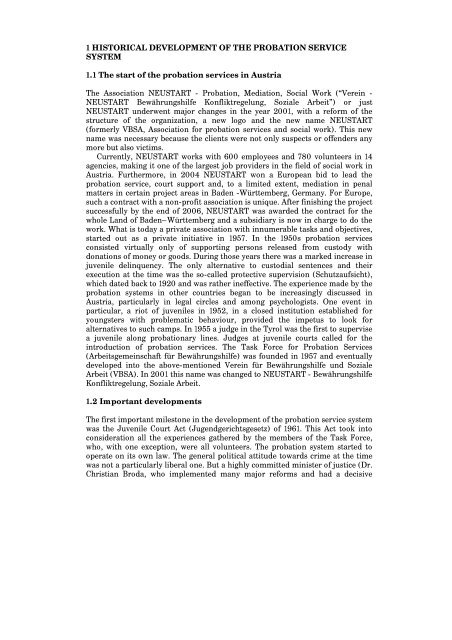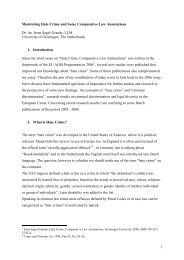Chapter 2 Austria - CEP, the European Organisation for Probation
Chapter 2 Austria - CEP, the European Organisation for Probation
Chapter 2 Austria - CEP, the European Organisation for Probation
You also want an ePaper? Increase the reach of your titles
YUMPU automatically turns print PDFs into web optimized ePapers that Google loves.
1 HISTORICAL DEVELOPMENT OF THE PROBATION SERVICESYSTEM1.1 The start of <strong>the</strong> probation services in <strong>Austria</strong>The Association NEUSTART - <strong>Probation</strong>, Mediation, Social Work (“Verein -NEUSTART Bewährungshilfe Konfliktregelung, Soziale Arbeit”) or justNEUSTART underwent major changes in <strong>the</strong> year 2001, with a re<strong>for</strong>m of <strong>the</strong>structure of <strong>the</strong> organization, a new logo and <strong>the</strong> new name NEUSTART(<strong>for</strong>merly VBSA, Association <strong>for</strong> probation services and social work). This newname was necessary because <strong>the</strong> clients were not only suspects or offenders anymore but also victims.Currently, NEUSTART works with 600 employees and 780 volunteers in 14agencies, making it one of <strong>the</strong> largest job providers in <strong>the</strong> field of social work in<strong>Austria</strong>. Fur<strong>the</strong>rmore, in 2004 NEUSTART won a <strong>European</strong> bid to lead <strong>the</strong>probation service, court support and, to a limited extent, mediation in penalmatters in certain project areas in Baden -Württemberg, Germany. For Europe,such a contract with a non-profit association is unique. After finishing <strong>the</strong> projectsuccessfully by <strong>the</strong> end of 2006, NEUSTART was awarded <strong>the</strong> contract <strong>for</strong> <strong>the</strong>whole Land of Baden–Württemberg and a subsidiary is now in charge to do <strong>the</strong>work. What is today a private association with innumerable tasks and objectives,started out as a private initiative in 1957. In <strong>the</strong> 1950s probation servicesconsisted virtually only of supporting persons released from custody withdonations of money or goods. During those years <strong>the</strong>re was a marked increase injuvenile delinquency. The only alternative to custodial sentences and <strong>the</strong>irexecution at <strong>the</strong> time was <strong>the</strong> so-called protective supervision (Schutzaufsicht),which dated back to 1920 and was ra<strong>the</strong>r ineffective. The experience made by <strong>the</strong>probation systems in o<strong>the</strong>r countries began to be increasingly discussed in<strong>Austria</strong>, particularly in legal circles and among psychologists. One event inparticular, a riot of juveniles in 1952, in a closed institution established <strong>for</strong>youngsters with problematic behaviour, provided <strong>the</strong> impetus to look <strong>for</strong>alternatives to such camps. In 1955 a judge in <strong>the</strong> Tyrol was <strong>the</strong> first to supervisea juvenile along probationary lines. Judges at juvenile courts called <strong>for</strong> <strong>the</strong>introduction of probation services. The Task Force <strong>for</strong> <strong>Probation</strong> Services(Arbeitsgemeinschaft für Bewährungshilfe) was founded in 1957 and eventuallydeveloped into <strong>the</strong> above-mentioned Verein für Bewährungshilfe und SozialeArbeit (VBSA). In 2001 this name was changed to NEUSTART - BewährungshilfeKonfliktregelung, Soziale Arbeit.1.2 Important developmentsThe first important milestone in <strong>the</strong> development of <strong>the</strong> probation service systemwas <strong>the</strong> Juvenile Court Act (Jugendgerichtsgesetz) of 1961. This Act took intoconsideration all <strong>the</strong> experiences ga<strong>the</strong>red by <strong>the</strong> members of <strong>the</strong> Task Force,who, with one exception, were all volunteers. The probation system started tooperate on its own law. The general political attitude towards crime at <strong>the</strong> timewas not a particularly liberal one. But a highly committed minister of justice (Dr.Christian Broda, who implemented many major re<strong>for</strong>ms and had a decisive




![AGIS2 Nov 08 Conference Report_[Version 2] - CEP, the European ...](https://img.yumpu.com/50764570/1/190x245/agis2-nov-08-conference-report-version-2-cep-the-european-.jpg?quality=85)











